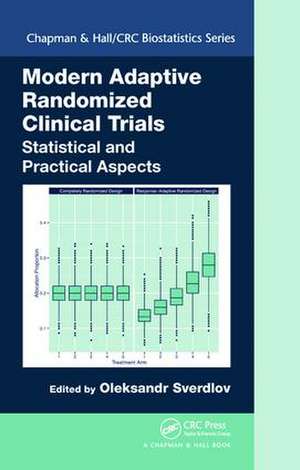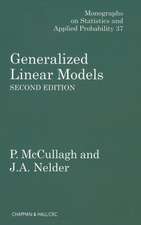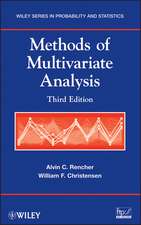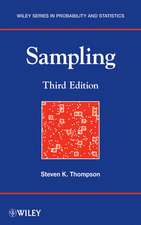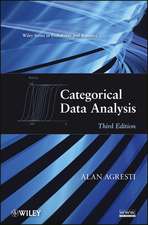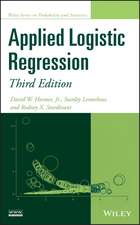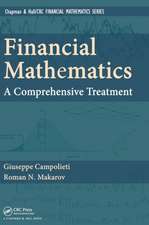Modern Adaptive Randomized Clinical Trials: Statistical and Practical Aspects: Chapman & Hall/CRC Biostatistics Series
Editat de Oleksandr Sverdloven Limba Engleză Hardback – 30 iun 2015
Modern Adaptive Randomized Clinical Trials: Statistical and Practical Aspects answers these questions and more.
From novel designs to cutting-edge applications, this book presents several new and key developments in adaptive randomization. It also offers a fresh and critical look at a number of already-classical topics.
Featuring contributions from statisticians, clinical trialists, and subject-matter experts in academia and the pharmaceutical industry, the text:
- Clarifies the taxonomy of the concept of adaptive randomization
- Discusses restricted, covariate-adaptive, response-adaptive, and covariate-adjusted response-adaptive (CARA) randomization designs, as well as randomized designs with treatment selection
- Gives an exposition to many novel adaptive randomization techniques such as brick tunnel randomization, targeted least absolute shrinkage and selection operator (LASSO)-based CARA randomization, multi-arm multi-stage (MAMS) designs, to name a few
- Addresses the issues of statistical inference following covariate-adaptive and response-adaptive randomization designs
- Describes a successful implementation of a single pivotal phase II/III adaptive trial in infants with proliferating hemangioma
- Explores some practical aspects of phase II dose-ranging studies and examines statistical monitoring and interim analysis issues in response-adaptive randomized clinical trials
Din seria Chapman & Hall/CRC Biostatistics Series
-
 Preț: 386.63 lei
Preț: 386.63 lei - 5%
 Preț: 338.18 lei
Preț: 338.18 lei - 5%
 Preț: 656.97 lei
Preț: 656.97 lei -
 Preț: 341.43 lei
Preț: 341.43 lei -
 Preț: 355.92 lei
Preț: 355.92 lei - 8%
 Preț: 432.16 lei
Preț: 432.16 lei -
 Preț: 354.78 lei
Preț: 354.78 lei -
 Preț: 342.90 lei
Preț: 342.90 lei -
 Preț: 288.81 lei
Preț: 288.81 lei -
 Preț: 312.36 lei
Preț: 312.36 lei - 9%
 Preț: 644.58 lei
Preț: 644.58 lei - 8%
 Preț: 376.64 lei
Preț: 376.64 lei -
 Preț: 372.30 lei
Preț: 372.30 lei -
 Preț: 356.64 lei
Preț: 356.64 lei - 8%
 Preț: 531.51 lei
Preț: 531.51 lei - 9%
 Preț: 608.33 lei
Preț: 608.33 lei - 9%
 Preț: 766.28 lei
Preț: 766.28 lei -
 Preț: 378.12 lei
Preț: 378.12 lei -
 Preț: 356.64 lei
Preț: 356.64 lei - 9%
 Preț: 682.94 lei
Preț: 682.94 lei - 9%
 Preț: 594.80 lei
Preț: 594.80 lei -
 Preț: 311.47 lei
Preț: 311.47 lei -
 Preț: 362.08 lei
Preț: 362.08 lei - 9%
 Preț: 833.75 lei
Preț: 833.75 lei - 9%
 Preț: 683.12 lei
Preț: 683.12 lei - 9%
 Preț: 681.83 lei
Preț: 681.83 lei -
 Preț: 370.53 lei
Preț: 370.53 lei - 9%
 Preț: 940.39 lei
Preț: 940.39 lei - 18%
 Preț: 791.14 lei
Preț: 791.14 lei - 18%
 Preț: 702.37 lei
Preț: 702.37 lei - 18%
 Preț: 1730.31 lei
Preț: 1730.31 lei - 28%
 Preț: 875.16 lei
Preț: 875.16 lei - 18%
 Preț: 786.89 lei
Preț: 786.89 lei - 25%
 Preț: 825.63 lei
Preț: 825.63 lei - 15%
 Preț: 678.14 lei
Preț: 678.14 lei - 25%
 Preț: 557.58 lei
Preț: 557.58 lei - 29%
 Preț: 625.83 lei
Preț: 625.83 lei - 18%
 Preț: 786.38 lei
Preț: 786.38 lei - 25%
 Preț: 778.07 lei
Preț: 778.07 lei - 25%
 Preț: 628.29 lei
Preț: 628.29 lei - 28%
 Preț: 881.75 lei
Preț: 881.75 lei - 25%
 Preț: 526.81 lei
Preț: 526.81 lei - 18%
 Preț: 797.46 lei
Preț: 797.46 lei - 15%
 Preț: 479.86 lei
Preț: 479.86 lei - 18%
 Preț: 1017.63 lei
Preț: 1017.63 lei
Preț: 1124.97 lei
Preț vechi: 1371.92 lei
-18% Nou
Puncte Express: 1687
Preț estimativ în valută:
215.29€ • 223.94$ • 177.73£
215.29€ • 223.94$ • 177.73£
Carte tipărită la comandă
Livrare economică 14-28 aprilie
Preluare comenzi: 021 569.72.76
Specificații
ISBN-13: 9781482239881
ISBN-10: 1482239884
Pagini: 536
Ilustrații: 45 black & white illustrations, 52 black & white tables
Dimensiuni: 156 x 234 x 28 mm
Greutate: 0.91 kg
Ediția:1
Editura: CRC Press
Colecția Chapman and Hall/CRC
Seria Chapman & Hall/CRC Biostatistics Series
ISBN-10: 1482239884
Pagini: 536
Ilustrații: 45 black & white illustrations, 52 black & white tables
Dimensiuni: 156 x 234 x 28 mm
Greutate: 0.91 kg
Ediția:1
Editura: CRC Press
Colecția Chapman and Hall/CRC
Seria Chapman & Hall/CRC Biostatistics Series
Cuprins
An Overview of Adaptive Randomization Designs in Clinical Trials. Efron's Biased Coin Design Revisited: Statistical Properties, Randomization-Based Inference, and Sequential Monitoring. Adaptive Biased Coins: Achieving Better Balance without Compromising Randomness. Brick Tunnel and Wide Brick Tunnel Randomization for Studies with Unequal Allocation. Development of Novel Covariate-Adaptive Randomization Designs. Optimal Model-Based Covariate-Adaptive Randomization Designs. Statistical Inference Following Covariate-Adaptive Randomisation: Recent Advances. Covariate-Adaptive Randomization with Unequal Allocation. Optimal Allocation Designs for a Multi-Arm Multi-Objective Clinical Trial. Response-Adaptive Randomization: An Overview of Designs and Asymptotic Theory. Statistical Inference Following Response-Adaptive Randomization. Sample Size Re-Estimation in Adaptively Randomized Clinical Trials with Missing Data. Some Caveats for Outcome Adaptive Randomization in Clinical Trials. Efficient and Ethical Adaptive Clinical Trial Designs to Detect Treatment–Covariate Interaction. Longitudinal Covariate-Adjusted Response-Adaptive Randomization: Impact of Missing Data. Targeted Covariate-Adjusted Response-Adaptive LASSO-Based Randomized Controlled Trials. Covariate-Balanced Bayesian Adaptive Randomization: Achieving Tradeoff Between Inferential and Ethical Goals in Small and Moderate Size Trials. Multi-Arm Multi-Stage Designs for Clinical Trials with Treatment Selection. Sequential Elimination in Multi-Arm Selection Trials. Accounting for Parameter Uncertainty in Two-Stage Designs for Phase II Dose-Response Studies. A Single Pivotal Adaptive Trial in Infants with Proliferating Hemangioma: Rationale, Design Challenges, Experience, and Recommendations. Practical Implementation of Dose–Response Adaptive Trials. Statistical Monitoring of Data in Response-Adaptive Randomized Clinical Trials.
Recenzii
"The discussion of the various type of adaptive designs is quite thorough and broad, incorporating many of the recent advances in the field. The book provides an excellent theoretical description of many of the more commonly employed adaptations. … a valuable resource for researchers and practitioners in adaptive trial design. The book covers a wide range of topics in adaptive randomization, going into depth in a generalized framework that applies to a broad range of trial designs, and also includes some valuable methods on how to put these trials into practice."
—Journal of Biopharmaceutical Statistics, Issue 2, 2016
This is an impressive and useful book, which covers various types of adaptive randomisation
designs and provides a thorough exploration of the merits of adaptive randomisation.
—Lili Zhao, Department of Biostatistics, University of Michigan
" . . the book meets its objective of providing an up-to-date discussiononadaptive randomization designs and their applications in clinical trials. It is a great resource for those who are new to the field or for those who want an overview of the latest methods."
—Stanley E. Lazic, AstraZeneca, Cambridge
"Overall, the book covers many aspects of adaptive randomization studies and reports many new developments in the field with detailed statistical considerations. As regulatory reviewers, we can see ourselves delving into this book when we receive a submission with an adaptive randomization trial . . . The book would also prove a valuable resource for researchers in the field of adaptive randomization."
—Xiting Yang and Gerry Gray, Food and Drug Administration
"Many authors participated in assembling the book, including worldclass statisticians, each of whom contributed to the completeness of the disclosure of the book’s topic. The core value of the book is more than in simply demonstrated theories and formulas, but also in advice given on their practical application, specified examples, references to modern regulatory rules and links to SAS & R codes. It is a really well organised book that will be useful first and foremost for statisticians involved in clinical trials."
—International Society for Clinical Biostatistics
" . . . the book gives a broad overview of the different adaptive randomization strategies. Due to a clear organization and well-written introduction it is convenient to read, gives fascinating insights into different options, but may also raise further questions on applicability, acceptability, and gain in efficiency, stimulating further discussion and research in this area."
—Biometrical Journal , 2017
—Journal of Biopharmaceutical Statistics, Issue 2, 2016
This is an impressive and useful book, which covers various types of adaptive randomisation
designs and provides a thorough exploration of the merits of adaptive randomisation.
—Lili Zhao, Department of Biostatistics, University of Michigan
" . . the book meets its objective of providing an up-to-date discussiononadaptive randomization designs and their applications in clinical trials. It is a great resource for those who are new to the field or for those who want an overview of the latest methods."
—Stanley E. Lazic, AstraZeneca, Cambridge
"Overall, the book covers many aspects of adaptive randomization studies and reports many new developments in the field with detailed statistical considerations. As regulatory reviewers, we can see ourselves delving into this book when we receive a submission with an adaptive randomization trial . . . The book would also prove a valuable resource for researchers in the field of adaptive randomization."
—Xiting Yang and Gerry Gray, Food and Drug Administration
"Many authors participated in assembling the book, including worldclass statisticians, each of whom contributed to the completeness of the disclosure of the book’s topic. The core value of the book is more than in simply demonstrated theories and formulas, but also in advice given on their practical application, specified examples, references to modern regulatory rules and links to SAS & R codes. It is a really well organised book that will be useful first and foremost for statisticians involved in clinical trials."
—International Society for Clinical Biostatistics
" . . . the book gives a broad overview of the different adaptive randomization strategies. Due to a clear organization and well-written introduction it is convenient to read, gives fascinating insights into different options, but may also raise further questions on applicability, acceptability, and gain in efficiency, stimulating further discussion and research in this area."
—Biometrical Journal , 2017
Descriere
This book aids in identifying when to apply adaptive randomization designs in practice. Featuring contributions from statisticians, clinical trialists, and subject-matter experts in academia and industry, the text discusses restricted, covariate-adaptive, response-adaptive, and covariate-adjusted response-adaptive randomization designs, as well as randomized designs with treatment selection. It describes a successful implementation of a single pivotal phase II/III adaptive trial in infants with proliferating hemangioma, addresses practical aspects of phase II dose-ranging studies, and examines statistical monitoring and interim analysis issues in response-adaptive randomized clinical trials.
